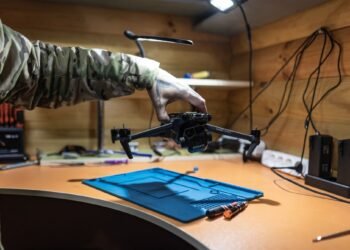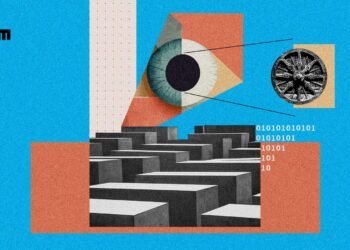Shortly after Donald Trump wins Georgia, it becomes painfully clear that I have made a grave mistake. I am sitting on my couch at home, but my virtual surroundings are a far cry from reality. I find myself in a giant convention hall filled with a cacophony of human-animal hybrids, most of them speaking in children’s voices. The news of Trump’s victory in a battleground state and his inevitable ascent to the US presidency is announced by a cross-legged skeleton who claims to be from the UK. He’s just here to join in on the Americans’ big day.
But this bizarre scenario is not unfolding in the real world, but in a virtual reality realm. I have made the unfortunate decision to follow one of the most crucial elections of our time from one of the most absurd places imaginable – deep in the metaverse.
The room I am in is part of the virtual reality platform VRChat, an open world where users can create and explore various rooms. Here, users can create their own 3D avatars and interact with each other through voice chat. Unlike Meta’s Horizon Worlds platform, which is limited to Meta’s VR hardware, VRChat is more inclusive, with support for Meta headsets, Steam headsets, PCs, and even phones.
I have logged on using a Meta Quest 3S headset and have joined dozens of other avatar-clad individuals to anxiously discuss the results of the 2024 US election. The room is called Election Night 2024, created by a user with the username AussieGuy92. It is a large virtual space that can accommodate up to 80 people and is designed to resemble a realistic convention hall where a campaign might host an election night watch party. The lobby is adorned with signs for the Trump-Vance and Harris-Walz campaigns, complete with smiling pictures of their respective presidential candidates. Inside the hall, there is a giant screen, rows of chairs for an audience, and large maps with each state labeled with its electoral college vote numbers. Outside, there is even a digital model of a city bus that can teleport you to a mock-up of the White House.
However, it quickly becomes apparent that this simulation is not functioning as intended. The user who created the space, AussieGuy92, is rarely present, so any dynamic elements he could control as our host remain inactive. Despite a schedule of streaming videos and events listed on the walls, none of the promised content is displayed on the screens inside the room. The election map remains unchanged throughout the night, leaving people to gather and share information about election returns on their own. That’s why I am grateful for the skeleton, who cannot even vote in this election, but is reading the results aloud from his phone.
“Looks like there’s a good chance he’s going to win,” the skeleton says early on in the night. “I just don’t trust the polls.”

















